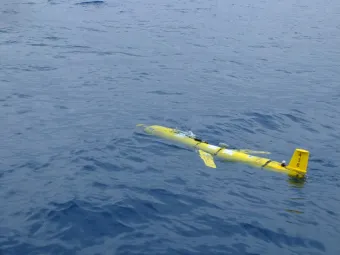
A brand new Standard Operating Procedure (SOP) for the use of oxygen sensors in autonomous vehicles has been released, bringing together expert knowledge from across the glider community, to make valuable oxygen sensor data more accessible to scientists.
The production of the document, co-led by scientists from the National Oceanography Centre (NOC) and endorsed by the Global Ocean Observing System (GOOS) and its glider component, OceanGliders, brought together over 20 collaborators to ensure data collected by gliders in Europe and around the globe is comparable, and therefore of use to the wider global science community.
It’s estimated that 50–80% of the oxygen production on Earth comes from the ocean, however levels of dissolved oxygen can be reduced due to warming ocean temperatures, and eutrophication, a process which leads water to become overly enriched with nutrients. Using sensors integrated on autonomous vehicles, such as gliders, to measure dissolved oxygen, helps scientists to better understand the processes driving oxygen depletion and the ecosystems’ health.
Whilst the use of gliders improves the coverage of data collection, a standardised procedure was required to bring together knowledge from around the world to enable better data sharing. Glider experts, sensor developers and end users collaborated on the open platform GitHub to produce the SOP titled ‘OceanGliders Oxygen SOP v1.0.0: A good example of open collaborative scientific work’. The SOP is a further step forward in sensor data collection, and has paved the way for the production of similar collaborative procedures for ocean variables including salinity and nitrates, which are currently underway.
Dr Patricia Lopez-Garcia, Sensor Science Delivery Lead at the NOC, and a co-lead of the SOP said: “It’s been a pleasure to be part of this initiative that includes experts from all around the world. A great opportunity to learn from the best, and share information in a very open and constructive way. Constructive feedback by anyone is welcome. We encourage both experts and new gliders users who want to start observing oxygen to feedback on the document. Experts are welcome to critically assess the specific methods and uncertainty ranges outlined in the SOP. New users can help to improve the SOP by providing a feedback from the user perspective.”
Dr Soeren Thomsen, lead of SOPs for the Glider community said: “We designed a best practice development and maintenance process which is fully transparent and open. This will help to democratize knowledge in the spirit of open science!”
Co-lead Dr Julius Busecke from Columbia University and Lamont-Doherty Earth Observatory said: “This project was very dear to me because of my past work as an observational oceanographer. These best practices, created by the world experts in the field, will make it much easier for students and people new to their platforms to produce high quality results. This living document will grow the community around glider observations, and help to drive new scientific discoveries”.
The SOP was supported by H2020 EuroSea and H2020 GROOM II projects and the EuroGOOS Glider Task Team.
Co-lead Patricia Lopez-Garcia was supported by TechOceanS project which received funding from the European Union’s Horizon 2020 research and innovation programme under grant agreement No 101000858 (TechOceanS). This output reflects only the author’s view and the Research Executive Agency (REA) cannot be held responsible for any use that may be made of the information contained therein.
Read the Standard Operating Procedure
Big science and solutions are enabled by innovate technology and world-leading facilities
Find out more about the ships and equipment, including a fleet of gliders, we operate on behalf of the science community here.